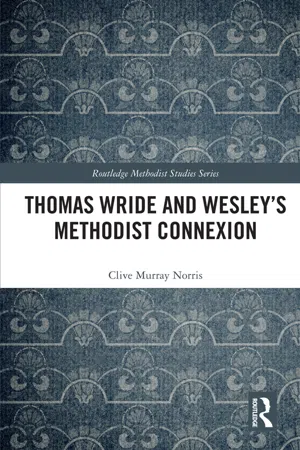
- 228 pages
- English
- ePUB (mobile friendly)
- Available on iOS & Android
Thomas Wride and Wesley’s Methodist Connexion
About this book
This book highlights the life and writings of an itinerant preacher in John Wesley's Methodist Connexion, Thomas Wride (1733-1807). Detailed studies of such rank and file preachers are rare, as Methodist history has largely been written by and about its leadership. However, Wride's ministry shows us that the development of this worldwide movement was more complicated and uncertain than many accounts suggest.
Wride's attitude was distinctive. He was no respecter of persons, freely criticising almost everyone he came across, and in doing so exposing debates and tensions within both Methodism and wider society. However, being so combative also led him into conflict with the very movement he sought to promote. Wride is an authentic, self-educated, and non-élite voice that illuminates important features of Eighteenth-Century life well beyond his religious activities. He sheds light on his contemporaries' attitudes to issues such as the role of women, attitudes towards and the practice of medicine, and the experience and interpretation of dreams and supernatural occurrences.
This is a detailed insight into the everyday reality of being an Eighteenth-Century Methodist minister. As such, this text will be of interest to academics working in Methodist Studies and Religious History, as well as Eighteenth-Century History more generally.
Trusted by 375,005 students
Access to over 1 million titles for a fair monthly price.
Study more efficiently using our study tools.
Information
1 The significance of Thomas Wride
Introduction
Wride’s reputation
Wride’s communications style
Table of contents
- Cover
- Half Title
- Series
- Title
- Copyright
- Contents
- List of figures and tables
- List of illustrations
- Preface
- Acknowledgements
- List of abbreviations
- 1 The significance of Thomas Wride
- 2 Thomas Wride’s story
- 3 Thomas Wride and John Wesley
- 4 Wride, women, and family life
- 5 Wride, preacher and physician
- 6 Wride’s personal and professional networks
- 7 Wride and the growing pains of John Wesley’s Connexion
- 8 Wesley, Wride, and the marketplace of ideas
- 9 Wesley’s Methodism and the supernatural
- 10 Conclusions
- Appendix
- Bibliography
- Index
Frequently asked questions
- Essential is ideal for learners and professionals who enjoy exploring a wide range of subjects. Access the Essential Library with 800,000+ trusted titles and best-sellers across business, personal growth, and the humanities. Includes unlimited reading time and Standard Read Aloud voice.
- Complete: Perfect for advanced learners and researchers needing full, unrestricted access. Unlock 1.4M+ books across hundreds of subjects, including academic and specialized titles. The Complete Plan also includes advanced features like Premium Read Aloud and Research Assistant.
Please note we cannot support devices running on iOS 13 and Android 7 or earlier. Learn more about using the app